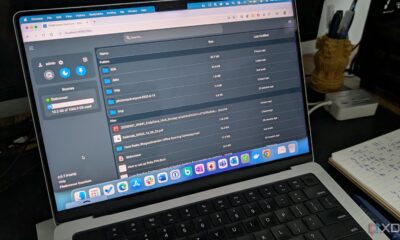Technology
Save $50 Monthly by Switching to Self-Hosted Services

A growing number of individuals are turning to self-hosted services in a bid to save money and maintain control over their data. One user reports a monthly savings of approximately $50 by replacing various paid subscriptions with self-hosted alternatives. This shift not only reduces costs but also ensures that personal data remains secure on local devices.
For months, the user relied on services like OneDrive, ChatGPT, and Microsoft 365, which collectively added up to significant monthly expenses. Despite the utility of these applications, the user found that they were not fully utilizing all available features, making the costs seem excessive. In response, they began exploring free alternatives that could deliver similar functionalities without the financial burden.
Transitioning to Cost-Effective Solutions
One of the first major changes was the adoption of Nextcloud, which effectively replaced both OneDrive and Google Drive for cloud storage needs. Unlike traditional cloud services that require users to upload data to remote servers, Nextcloud allows users to store files locally, accessible through their home network. By implementing a secure VPN and utilizing services like Cloudflare, the user can also access these files remotely, maintaining both privacy and convenience.
In addition, the user switched from Google Photos to Immich, which offers similar functionalities for photo storage and management. While the transition presented some minor inconveniences compared to the seamless integration offered by Google’s ecosystem, the trade-off for enhanced privacy was deemed worth it.
Office Software and AI Tools
The user also replaced Microsoft Office with LibreOffice, which provided all the necessary tools for document creation and management. Having used Microsoft Office for nearly a decade, they found that LibreOffice met their basic needs without the associated costs. The software is readily available for download, making it accessible to beginners and ensuring compatibility with Microsoft file formats.
Furthermore, the user explored the world of artificial intelligence by hosting their own language model using Ollama. This approach allows for running AI applications directly on personal hardware, eliminating concerns over data privacy since none of the input data leaves the user’s machine. To optimize performance, a system with at least 16GB of RAM is recommended, though alternatives like Raspberry Pi can also be utilized for those seeking a more compact solution.
While the transition to self-hosted services can involve some initial challenges, such as configuring new hardware or troubleshooting access issues, the user found the experience largely positive. The self-hosting community offers robust support through online forums, providing resources and advice for those venturing into this realm.
By making these changes, the user is not only saving money but also gaining greater control over their digital environment. As self-hosted services continue to gain popularity, more individuals may consider this path to enhance their online privacy and reduce their monthly expenses.
-

 Science1 month ago
Science1 month agoNostradamus’ 2026 Predictions: Star Death and Dark Events Loom
-

 Technology2 months ago
Technology2 months agoOpenAI to Implement Age Verification for ChatGPT by December 2025
-

 Technology7 months ago
Technology7 months agoDiscover the Top 10 Calorie Counting Apps of 2025
-

 Health5 months ago
Health5 months agoBella Hadid Shares Health Update After Treatment for Lyme Disease
-

 Health5 months ago
Health5 months agoAnalysts Project Stronger Growth for Apple’s iPhone 17 Lineup
-

 Technology5 months ago
Technology5 months agoElectric Moto Influencer Surronster Arrested in Tijuana
-

 Science2 months ago
Science2 months agoBreakthroughs and Challenges Await Science in 2026
-

 Education5 months ago
Education5 months agoHarvard Secures Court Victory Over Federal Funding Cuts
-

 Health5 months ago
Health5 months agoErin Bates Shares Recovery Update Following Sepsis Complications
-

 Science4 months ago
Science4 months agoStarship V3 Set for 2026 Launch After Successful Final Test of Version 2
-

 Technology7 months ago
Technology7 months agoMeta Initiates $60B AI Data Center Expansion, Starting in Ohio
-

 Technology6 months ago
Technology6 months agoDiscover How to Reverse Image Search Using ChatGPT Effortlessly





















